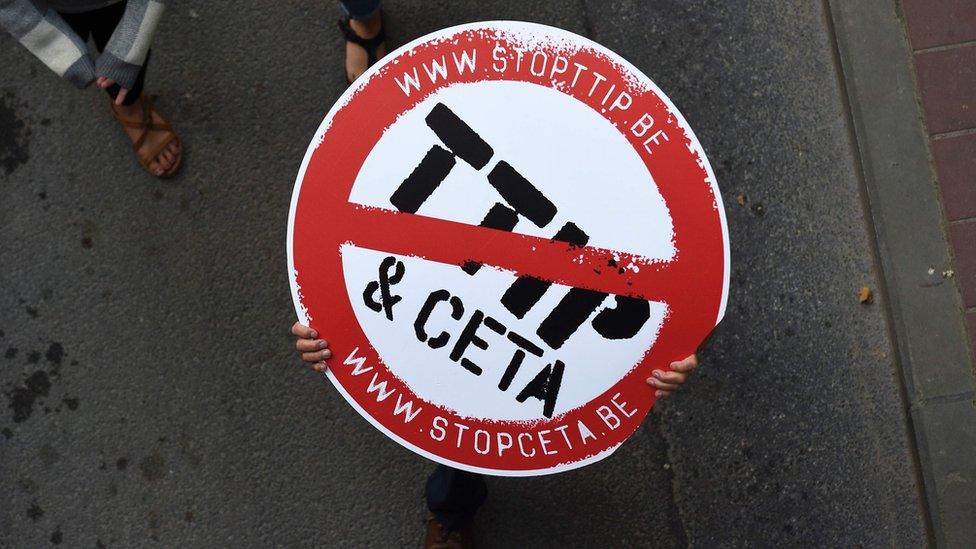Brexit: could Scotland 'do a Wallonia'?
- Published
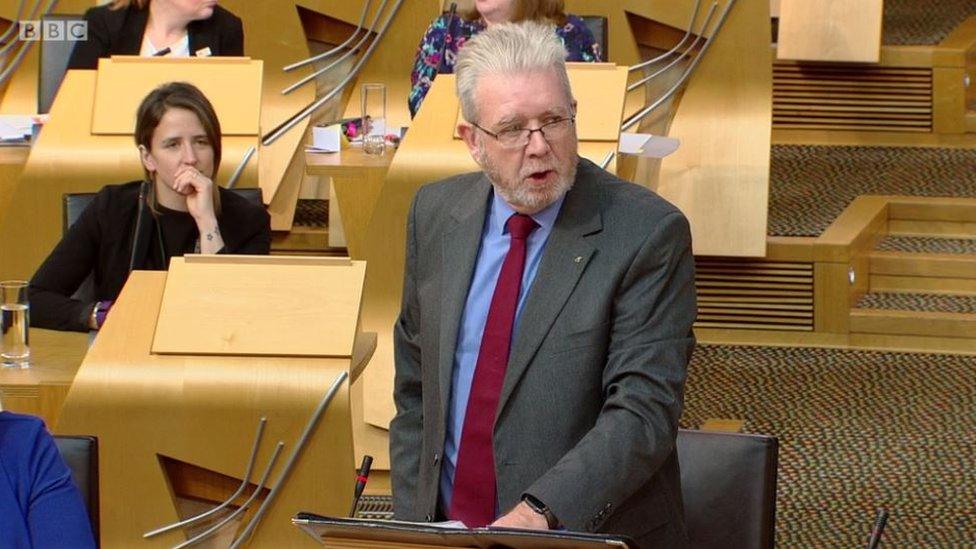
Mr Russell resisted the temptation to hit back after opposition members laughed at him
Parliamentary politics can have its comradely moments. To be honest, such occasions are most common when a member is stepping down and presents no further threat to his opponents or, more significantly, his own side.
Then backs are slapped in bonhomie - and thighs likewise, in humour. But there can be other warm interludes. Perhaps a shared drollery (not always at the expense of another Parliamentarian).
However, there are acerbic episodes too. Even slightly cruel. Such confronted Scotland's Brexit Minister, Michael Russell, at Holyrood today.
There he was, stressing his determination that Scotland's voice would be heard. His task made all the harder by the fact that his own voice was hoarse and gruff with a Brexit throat infection, no doubt inflicted upon him during the Downing Street talks earlier in the week.
On he sallied, offering the familiar Russell blend of intellect and analysis. He insisted that the Scottish government was seeking consensus.
And what did the brutes do? They laughed. Loudly and rather insolently too. The opposition benches, that is. The SNP ranks looked faintly distressed, as if someone had offered them a plateful of rillettes evidently past its sell-by date.
Was the Minister daunted? Friends, he was not. Momentarily, he appeared to be considering a riposte. Wiser counsel prevailed - and he continued to insist that the SG would seek common cause in protecting Scotland's interests.
Single market minded
But how are those now to be pursued? On 24 June, the day after the Brexit vote, the first minister said that Scotland had "voted to stay in the EU". She added that she intended "to discuss all options for doing so".
Without in any way abandoning that aim, she has since shifted the focus somewhat, more precisely concentrating upon the European single market.
Why so? A range of reasons. Firstly, there is little evidence of UK or EU support for the concept of Scotland entirely abrogating the Brexit decision.
Secondly, the single market remains the core prize for Scottish interests. Thirdly, strategy. Ms Sturgeon is seeking to make progress within the ambit of the UK, within the UK-led negotiations.
That has two sub-elements. She is genuinely seeking a deal. She also wants to convince the Scottish public that she tried her very best, that she pursued every avenue if, in the event, that effort fails and she feels constrained to call indyref2. The prospect which underlines this entire debate.
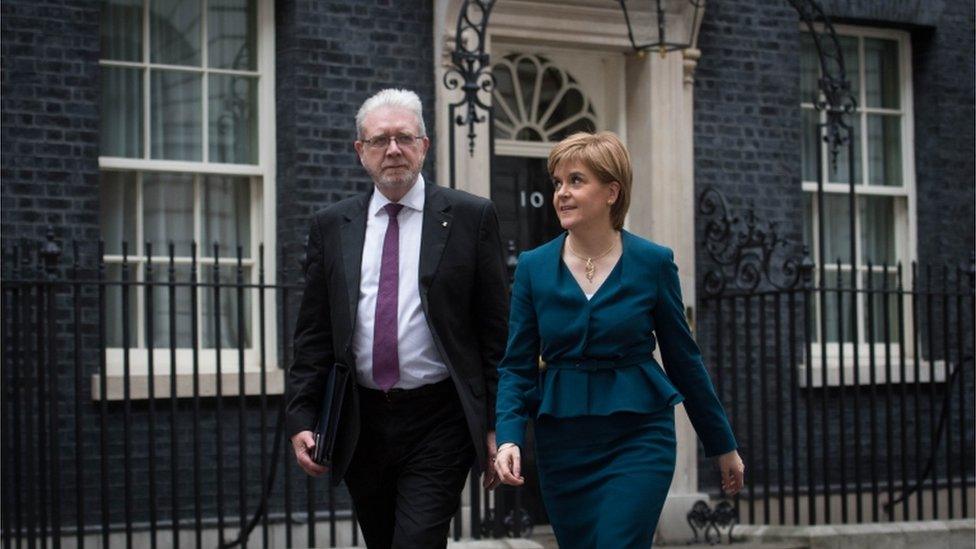
Mr Russell and Nicola Sturgeon have been negotiating with the UK government
A range of options now arise - although there is, as yet, minimal clarity on any of them. Something noted rather bluntly by Mr Russell when he briefed Holyrood this afternoon.
Might the UK (including Scotland) retain access to the single market? Companies - including very influential ones - want it, which should weigh with the UK Government.
Against that, EU leaders are adamant that membership of the single market involves all four freedoms therein. Including the freedom of movement. Otherwise known as immigration.
Which could bring two powerful motivations into conflict for the Tories - the single market (created, remember, by M. Thatcher and other EU leaders) versus immigration curbs.
We do not yet know where that conflict will lead. Hence, in essence, the lack of clarity within and from the UK Cabinet.
If the UK does not secure - or decides it does not want to secure - membership of or access to the single market, could Scotland do a deal on its own?
Potential challenges
Most informed observers caveat their view on this by noting that anything is possible within the EU - which is, after all, a political organisation, not an atomic compound governed by scientific rules. EU leaders could on occasion make Heisenberg seem like a pedantic stickler for precision.
But then the potential challenges crowd in. Members of the single market are currently the 28 members of the EU plus Iceland, Liechtenstein and Norway (surviving members of the European Free Trade Association).
In addition, Switzerland maintains distinctive access through multiple treaties. But some have questioned that arrangement, particularly since the Swiss voted for migration curbs. One EU observer said to me that the European institutions "would not want to do another Switzerland".
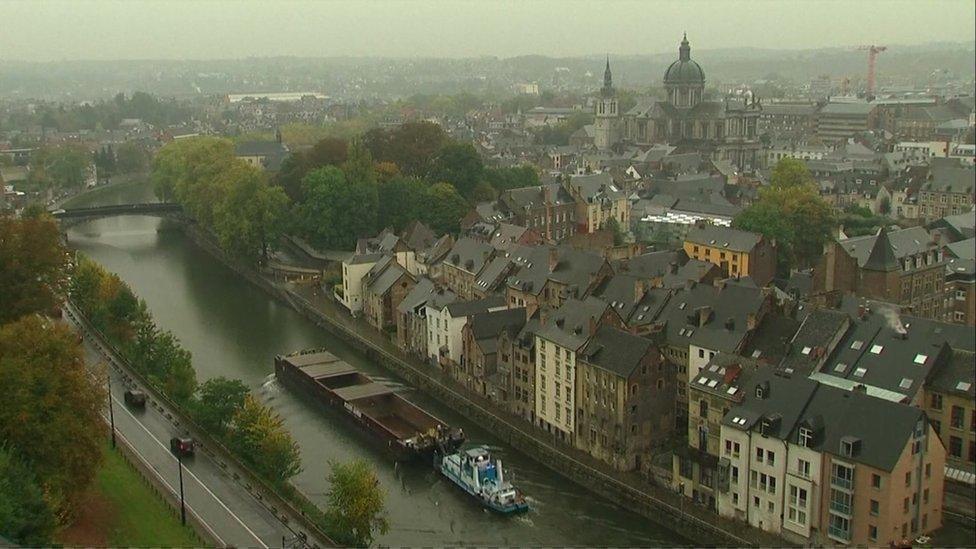
The Wallonian capital Namur, where the Canada trade deal was derailed
There is a further point. Whether through the EU, EFTA or individual treaty, all the adherents to the proclaimed benefits of the single market are full, autonomous states. They are not, like Scotland, sub-states within a large entity.
So, for Scotland to join or access the single market, two things would have to happen simultaneously. The UK Government would have to agree to transfer additional powers to Scotland - so that the SG could first strike a bargain and then have the list of competences to fulfil the requirements of membership.
Secondly, Europe - the EU, EFTA - would have to agree to admit Scotland as a sub-state entity, potentially creating a precedent which some EU states would not necessarily welcome.
Then there is talk of Wallonia. This French-speaking part of Belgium, like the other Belgian provinces, has a limited involved in foreign trade deals - and is currently blocking a major treaty between the EU and Canada.
Could Scotland do a Wallonia? Not in upsetting the Canadians: think of Nova Scotia. But in exercising a degree of foreign trade influence while retaining devolved status.
Again, anything is possible. See above. But remember that Wallonia and the other Belgian provinces are not in themselves members of the European single market. That is reserved to Belgium.
If anything, it is - right now - a complex conundrum which might have appealed to Wallonia's famous son, the surrealist artist René Magritte.
- Published24 October 2016
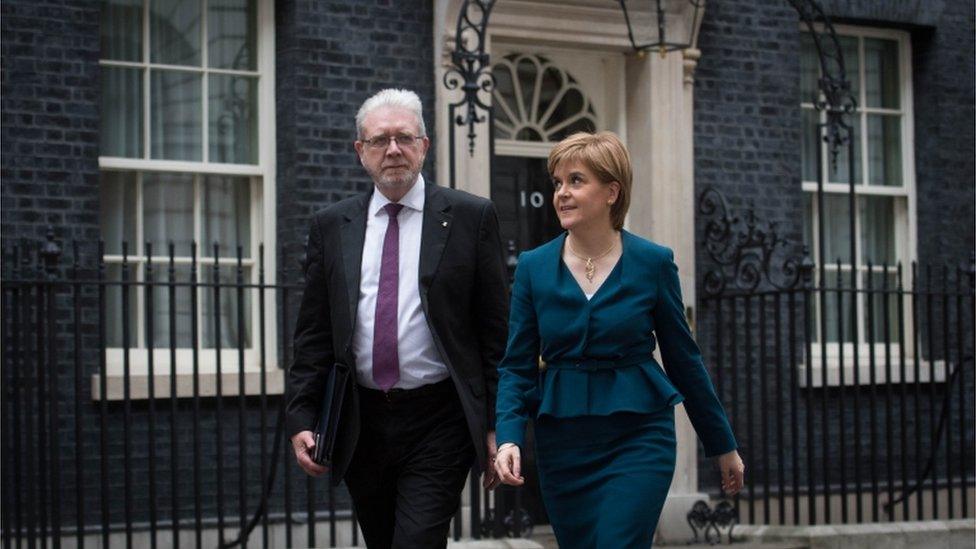
- Published24 October 2016
